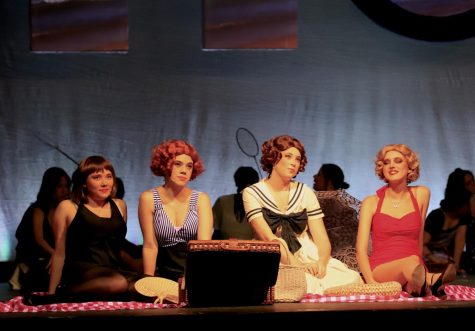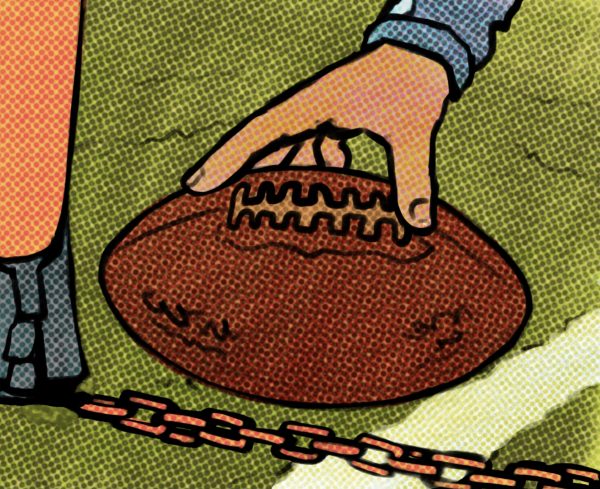It’s Time to Alter the Romanticized View of the Rom-Com
The romantic comedy (rom-com) genre is well known for being the stereotypical post-break-up movie: the funny distraction teenage girls absorb while sitting on their couches, consuming large quantities of ice cream. Many use these light-hearted films as a source of comfort and amusement, largely because they are silly, enjoyable and have a predictable ending.
Despite the momentary emotional relief that this genre provides, rom-coms do not always send positive messages. While these movies are fictional, exaggerated and are not meant to represent reality, the detrimental ideas that rom-coms push are harmful and have been accepted by society for too long. Rom-coms perpetuate negative stereotypes filled with unrealistic and toxic lessons, which are then internalized by audiences as typical interactions that can hurt real-life relationships. These impacts are even greater on teenagers, who are often naive and may have limited experience with romantic relationships. When watching rom-coms, teenagers may assume these fictional relationships are depicted realistically.
One cliche in rom-coms are grand romantic gestures. In “10 Things I Hate About You,” Patrick publicly declares his love to Kat by singing to her with the help of the school band. While this may appear to be romantic in the context of the situation, it is both rude and unrealistic. Such a public display could create pressure for someone to accept a romantic relationship they do not want. While Kat may appreciate the gesture in the movie, in reality, it could make someone feel uncomfortable.
Transformative makeovers are another trope in rom-coms. In these scenes, the appearance of the protagonist, often female, is transformed to meet the Western standards of beauty. In “She’s All That,” protagonist Laney receives a makeover that consists of cutting her hair, putting on makeup, updating her wardrobe and removing her glasses. These scenes enforce unrealistic beauty standards, involving women with straight hair and perfect skin. Stereotypical beauty ideals are already a toxic influence within society, and makeover scenes further establish this. In reality, many people have curly or wavy hair, and most teenagers have acne. Therefore, the rom-com portrayals of beauty greatly differ from reality and promote unattainable beauty standards to young and impressionable teenage girls, which may cause them to feel insecure about their appearances.
In fact, many rom-coms suggest that people must change themselves in order to win the approval of others. The most obvious example of this is in “Grease.” By the end of the movie, Sandy changes her entire appearance, complete with a new hairstyle and outfit, and changes her attitude and demeanor in order to date Danny. In addition, she starts smoking, despite being disgusted by it at the beginning of the movie. Meanwhile, Danny changes himself by joining several sports teams in order to win over Sandy. In the movie, Danny tells his friends, “I’m gonna do anything I can to get her.” This shows Danny’s obsession with Sandy and his willingness to go to extreme lengths to gain her approval, even if these behaviors are toxic.
This manipulative conduct is common in rom-coms, and these scenes teach teenagers that such attitudes are an acceptable way to treat a potential significant other and that these behaviors need to be tolerated in order to find love.
Furthermore, aggressive behavior is normalized when committed by a man, but stigmatized when perpetrated by a woman. In “Sweet Home Alabama,” supporting character Jake displays a volatile, combative personality. This behavior is accepted by the lead character Melanie, who ultimately gets back together with him. In contrast, in “The Proposal,” Margaret is portrayed as cruel and pushy because she has a successful career and holds a lot of power. This logic displays assertive women in a negative light, indicating a double standard between genders.
Another form of manipulative behavior often conveyed in rom-coms is stalking. A study written by Julia R. Lippman titled “I Did It Because I Never Stopped Loving You: The Effects of Media Portrayal of Persistent Pursuit on Beliefs About Stalking,” explains that people internalize ideas that the stalking behaviors portrayed in movies are acceptable in real life.
In rom-coms, these behaviors are sometimes considered to be romantic. In “Love Actually,” Mark secretly films Juliet, his friend’s wife. Later in the movie, he confesses his love for her by showing up at her front door and holding up cue cards to express his feelings. Because this is portrayed as a romantic gesture, his stalking behaviors are disregarded. In reality, internalizing these actions as acceptable is incredibly dangerous.
A study by the American Journal of Preventive Medicine found that 14 percent of the surveyed young girls and 13 percent of the surveyed young boys were victims of stalking. Another study, written by Emily F. Rothman, Eva Bahrami, Nnenna Okeke and Elizabeth Mumford, titled “Prevalence of and Risk Markers for Dating Abuse-Related Stalking and Harassment Victimization and Perpetration in a Nationally Representative Sample of U.S. Adolescents,” found that among teens ages 12 to 18, 48 percent had experienced stalking or harassment, and 42 percent had themselves stalked someone. The glorification of stalking behaviors in movies are normalized, and as a result, have harmful effects on teenagers and young adults.
Additionally, an Australian man was accused of stalking a woman in 2015. In court, he claimed that he “learned from Bollywood movies that relentlessly pursuing women was the only way to woo them.” This rationale was named the “Bollywood Defense,” and his case was ultimately dismissed.
Though behaviors in rom-coms such as the idea of “persistent pursuit” can be seen as romantic, in real life they can signal red flags in relationships. Behaviors such as following someone, radically changing appearances or filming a person without their permission might result in a restraining order or a phone call from a concerned family member. For the average teenager, these lessons can affect their perception of a healthy relationship and how they view themselves in the future.

Katia Stutz, a senior at Pali High, started writing for the Tideline in her sophomore year and became Managing Editor in her junior year. Outside of school,...

Leela Rao, a Senior, is Tideline’s current Managing Editor. She was an illustrator at Tideline for two years and has a passion for art and literature.

















